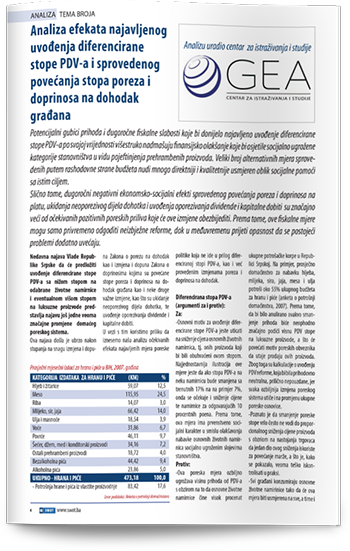Analysis shows that long-term negative economic-social effects derived from the new fiscal measures significantly surpass the expected increase of tax income that would be secured by these changes. These fiscal measures can only temporarily postpone the inevitable reforms, while, in the meantime, there is danger of additional increase of the existing problems.
Complete analysis of effects of introducing the new fiscal measures can be found here (local language only).
Below, we bring you a brief overview of pros and cons regarding tax and contribution increase, abolishing of the exempt part of earnings and introduction of taxation over dividends and capital profit.
Arguments pro:
- Basic objective of these changes is to increase income of the budget and funds in the light of the budget deficit increase and deficit increase of the Fund for Retired and Disabled Persons’ Insurance, Healthcare Fund and Public Fund for Children Protection.
- Abolishing of the exempt part of earnings somewhat simplifies the tax application administrative procedures of withholding taxes
- By introducing taxation over dividends and capital profit, tax baseline is increased legally, i.e. new sorts of income are covered by the tax on earnings.
Arguments con:
Increased tax and contribution rates on citizens’ earnings
- This measure has negative effect on sustaining the existing and creating new jobs. There are many researches that prove that increase of taxation of work has negative influence on employment and that it stimulates moonlighting. Therefore, the timing of the introduction of this measure is especially unfavorable, bearing in mind negative trends at the labor market of RS during 2010 (decrease of employed persons by 9.480 in RS in September 2010 in comparison with the same period the year before; increase in the number of the unemployed by 5.087 over the course of 2010).
- Therefore, negative impact of this measure on employment will especially be expressed with persons employed at low paid jobs, in accordance with their weak negotiation power at the labor market. These individuals can expect lesser chances for employment and decrease of their own net earnings in favor of increased taxes and contributions.
- Over a short period of time, increase in tax rates on earnings will bring modest increase in income, having in mind that income realized from taxes on earnings participates relatively little (10%) in the overall income. According to projections of the Government of RS, income realized from taxes on earnings will be increased in 2011 for 14 million KM or around 0,4% of the consolidated budget of RS.
- In the mid and long terms, this measure can also bring negative effect onto tax incomes once negative effects on employment are materialized and moonlighting is increased.
- Same measure is in conflict with one of nine key short-term priorities for B&H in the process of accession to the EU determined by the EU through “European partnership with B&H”. This priority states: “To decrease structural rigidnesses that impair functioning of the labor market, especially work taxation…., in order to increase inclusion and employment rate.”
- Increasing the contribution rate is surely not the solution for existing problems in pension and healthcare systems. We fear that this measure will cause another delay or slowing down of structural problems’ resolution in all areas. Therefore, it is surely necessary to support reforms of the first pillar of the retired and disabled persons’ insurance as well as to emphasize the importance of introducing the market principle for the greatest number of healthcare services possible that are financed from the Healthcare Fund.

